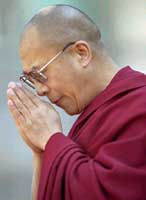Dalai Lama, the world's conscience keeper
By Mayank Chhaya, New Kerala, July 4, 2005
New York, USA -- As he turns 70 on July 6, the Dalai Lama has grown far larger than his cause and become a global conscience keeper.
 Although Tibet remains the centrepiece of the Dalai Lama's life, his influence transcends beyond some six million Tibetans and a geographical entity, which is one fourth of China. It is a serious struggle for him to confine himself to just Tibet any longer, considering that he has built up an ever-growing following internationally.
Although Tibet remains the centrepiece of the Dalai Lama's life, his influence transcends beyond some six million Tibetans and a geographical entity, which is one fourth of China. It is a serious struggle for him to confine himself to just Tibet any longer, considering that he has built up an ever-growing following internationally.
In 1978, when he first came to the US, his supporters could not muster up a couple of hundred people. "They did not understand whether the Dalai Lama was human or animal," the Dalai Lama said with his trademark belly-shaking laughter.
Now his lectures routinely attract thousands of people. According to Jeffery Paine, author of the celebrated book "Re-enchantment: Tibetan Buddhism Comes To The West", the number of Buddhist followers has doubled faster than any other religion or philosophy.
Yet, for the Dalai Lama, it has never been about expanding his flock. "I want no one to become Buddhist because I am a Buddhist. I just want them to be compassionate and decent in whatever faith they practise. Buddhism is not about conversion," he said.
Having been stateless for 46 years, the Dalai Lama has been compelled to cast himself as a global citizen even as he pushes the cause of Tibet with relentless, albeit as some say compromising, vigour. Now that complete independence for Tibet is no longer the mainstay of his campaign, having replaced it with autonomy, the Dalai Lama is genuinely hopeful that he would return to the "land of snows" in his lifetime.
At 70 he is the longest living of the 14 Dalai Lamas, and age is certainly a factor for him as well as the Tibetans. "I always think that when Tibet is at such a critical juncture, it will not do if I do not live," the Dalai Lama said in the midst of a series of prayers for his long life held by the Central Tibetan Administration in McLeodganj, the seat of his government-in-exile in India.
He came to India in exile when he was only 24 years old and has over the past four and a half decades transformed himself from being a mystical figure that Tibetans revere and worship in hushed tones with unquestioning faith into a democrat open to critical scrutiny.
"He is quite prepared to make himself completely redundant to secular affairs and pursue his passion for Buddhist studies as an ordinary monk. But we all know that the Dalai Lama enjoys extraordinary love and respect among the Tibetan people. He has said he will remain in whatever role the people choose for him," according his secretary and trusted aide Tenzin Geyche Tethong.
While the seven-century-old institution of the Dalai Lama retains much of its powerful pull on the minds of the Tibetan people, Tenzin Gyatso has steadfastly put a democratic structure since his arrival in India in 1959.
Rising from a simple peasant family from the village of Tengster, with a population a few hundred in Amdo province of Tibet, the Dalai Lama has for over six and a half decades been showered with attention reserved for divinity.
Quite easily he has been the most influential of all Dalai Lamas, considering the modern context of his rise. Since the 1970s he has visited dozens of countries, carrying with him his message of compassion without selling any religion unlike any comparable religious figure. The only other figure who carried the kind of moral authority without any aggressive religiosity was Mahatma Gandhi, whom the Dalai Lama considers an avatar.
When the Norwegian Nobel Committee decided to confer the 1989 Nobel Peace prize on him, it noted with obvious discomfiture the omission of Gandhi from the list. The Dalai Lama himself, however, has always been described as a passionate follower of Gandhi. Interestingly, there are many who see him in some sense as Gandhi's worthy successor.
As his special envoys concluded the fourth round of talks with their Chinese counterparts in Bern, Switzerland, June 29-30, the hope of finding an amicable solution to one of the most intractable issues of our time has remained eternal.
"Mahatma Gandhi's philosophy worked for India, why would it not work for us?" the Dalai Lama once wondered. The question was, of course, rhetorical.

 Although Tibet remains the centrepiece of the Dalai Lama's life, his influence transcends beyond some six million Tibetans and a geographical entity, which is one fourth of China. It is a serious struggle for him to confine himself to just Tibet any longer, considering that he has built up an ever-growing following internationally.
Although Tibet remains the centrepiece of the Dalai Lama's life, his influence transcends beyond some six million Tibetans and a geographical entity, which is one fourth of China. It is a serious struggle for him to confine himself to just Tibet any longer, considering that he has built up an ever-growing following internationally.